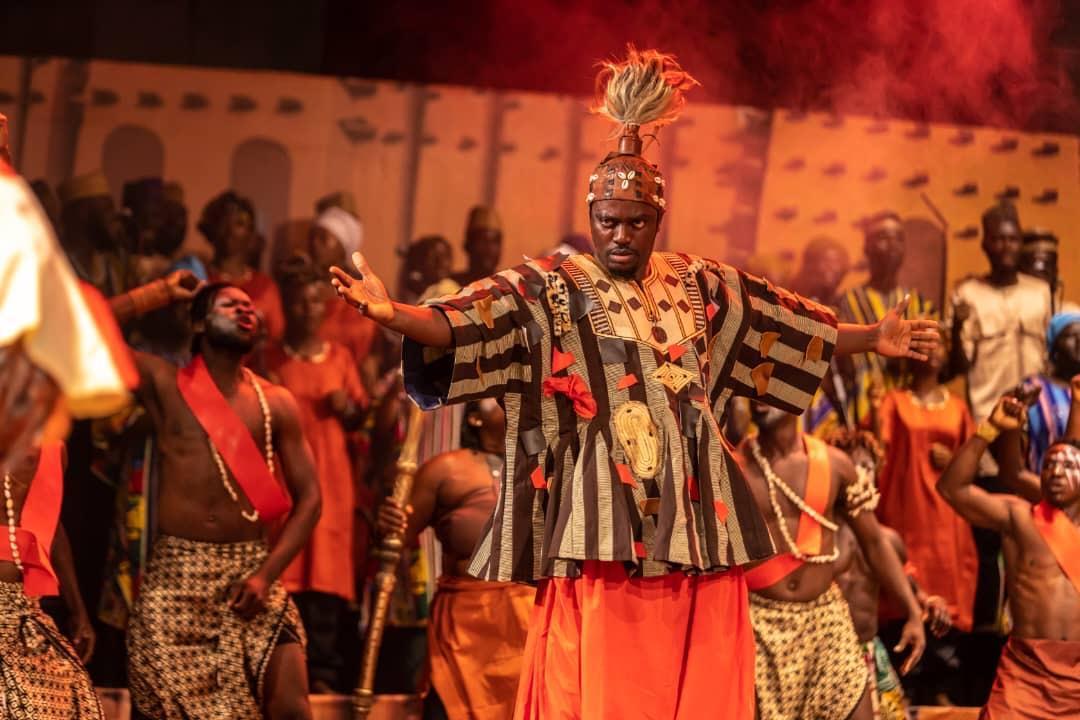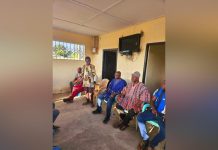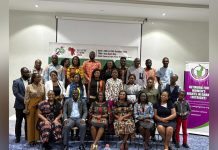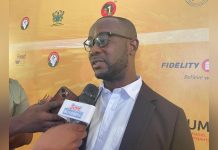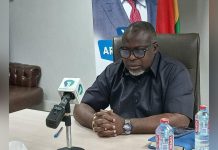Africa-Press – Ghana. The spirit of Mansa Musa and the Trail of Lost Gold continues its Pan-African journey, this time arriving in Egypt with a full Ghanaian cast and crew.
After an acclaimed performance in Barbados that stirred international attention, the production created by Ghanaian playwright and cultural entrepreneur Chief Moomen was staged in Cairo as part of Afreximbank’s farewell celebrations for its outgoing President, Professor Benedict Oramah, and the welcoming of the new President, Dr. Elombi.
Supported by Afreximbank, the production featured an 80-member ensemble from Ghana and an additional 20 Egyptian performers, marking one of the most ambitious cross-cultural collaborations in contemporary African theatre.
Chief Moomen described the Cairo performance as a milestone for the wider African creative movement.
“This performance was a statement about the power of African art to unite our continent,” said Moomen.
“From Accra to Barbados and now to Cairo, we are building bridges across time and space, showing that African stories can travel, inspire, and transform. We are deeply grateful to Afreximbank and Professor Oramah for believing in this vision from the very beginning.”
The event was attended by Afreximbank staff, partners, and dignitaries from across the world, many of whom described the evening as both emotional and inspiring. The performance rich with music, poetry, and choreography paid homage to Mansa Musa, the 14th-century emperor of Mali, while drawing parallels to Africa’s modern-day pursuit of prosperity and cultural confidence.
Among the evening’s standout performers was Daniel Kojo Delong, known to many as The Actor’s Preacher, whose portrayal of Sumanguru once again drew praise from critics and audiences alike.
“Every time I step on stage with Mansa Musa, I feel I’m carrying a piece of Africa’s unfinished story,” Delong told reporters after the show.
“In Cairo, surrounded by Africans from different regions, it felt like history was breathing again, alive, united, and full of hope.”
Mawuko Kuadzi, CEO of the Africa Monologue Challenge, described the production as “a true representation of African culture and unity,” commending Afreximbank for its leadership in championing the creative economy.
“For years we’ve spoken about supporting African talent; Afreximbank is doing it in a tangible way,” Kuadzi said.
Afrexim bank is financing identity, dignity, and the future of African storytelling.”
Chief Moomen added that both Professor Oramah and Dr. Elombi have been proposed as Global Patrons of The Mansa World, symbolizing continuity and commitment to Africa’s creative and cultural development.
“Professor Oramah believed in us when all we had was a dream,” Moomen said. “Honouring him in Cairo felt right. But it also marks a transition for us, from the pilot phase to a global commercial stage. Africa’s creative renaissance is only beginning.”
The journey of ‘The Mansa World’ from Ghana to the Caribbean and now to North Africa reflects a growing momentum behind Africa’s creative industries, as governments, institutions, and financiers begin to see the arts as engines of both identity and economic growth.
Dwomoh-Doyen Benjamin, President of the African Chamber of Content Producers, encouraged collaboration within Africa’s creative economy to establish a unified presence that will strengthen the continent’s brand and attract appropriate investments and development opportunities.
He also commended the production team behind Mansa World for their continued efforts in presenting positive narratives about Africa.
As the curtain fell in Cairo, the audience’s standing ovation echoed what the cast had carried across continents: that Africa’s greatest empire was not just Mansa Musa’s gold, but its imagination.
“The Mansa World reminds us that history is within us,” Delong said quietly, as he exited the theatre.Edited by George-Ramsey Benamba
Chief Moomen added that both Professor Oramah and Dr. Elombi have been proposed as Global Patrons of The Mansa World, symbolizing continuity and commitment to Africa’s creative and cultural development.
“Professor Oramah believed in us when all we had was a dream,” Moomen said. “Honouring him in Cairo felt right. But it also marks a transition for us, from the pilot phase to a global commercial stage. Africa’s creative renaissance is only beginning.”
The journey of ‘The Mansa World’ from Ghana to the Caribbean and now to North Africa reflects a growing momentum behind Africa’s creative industries, as governments, institutions, and financiers begin to see the arts as engines of both identity and economic growth.
Dwomoh-Doyen Benjamin, President of the African Chamber of Content Producers, encouraged collaboration within Africa’s creative economy to establish a unified presence that will strengthen the continent’s brand and attract appropriate investments and development opportunities.
He also commended the production team behind Mansa World for their continued efforts in presenting positive narratives about Africa.
As the curtain fell in Cairo, the audience’s standing ovation echoed what the cast had carried across continents: that Africa’s greatest empire was not just Mansa Musa’s gold, but its imagination.
“The Mansa World reminds us that history is within us,” Delong said quietly, as he exited the theatre.
For More News And Analysis About Ghana Follow Africa-Press


